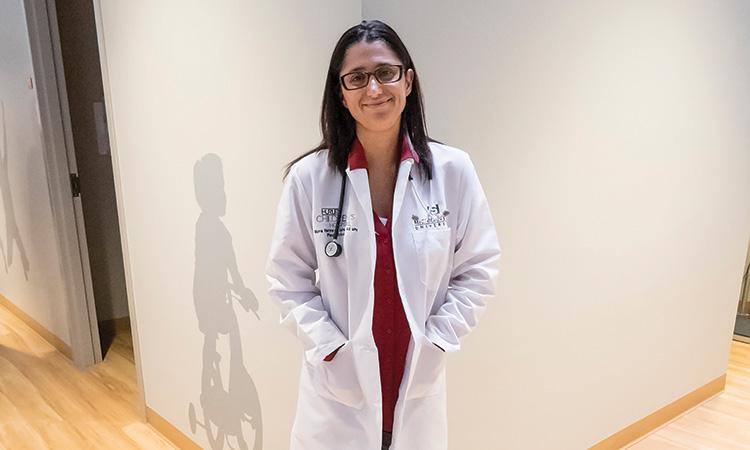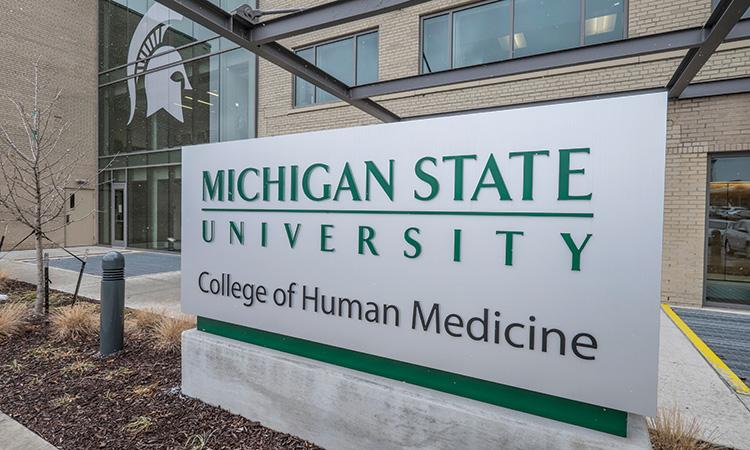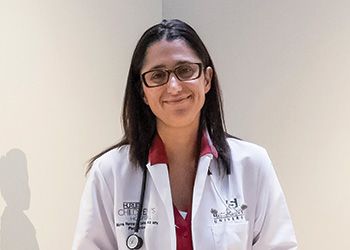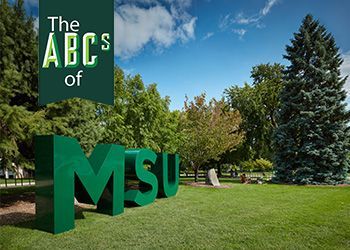Dr. Mona Hanna-Attisha – Rising to the Challenge
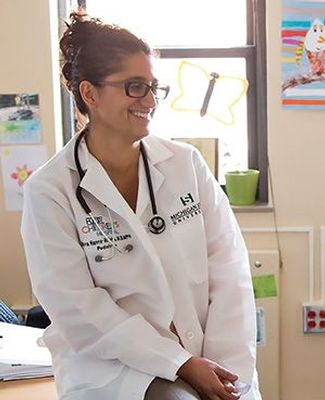
Dr. Mona Hanna-Attisha – Rising to the Challenge
Physician Mona Hanna-Attisha of MSU’s College of Human Medicine and her team helped prove that the children of Flint had been poisoned by a lead-contaminated water supply. Now she is working to build a new and better model for public health.
October 1, 2019On a sweltering Wednesday in June, Dr. Mona Hanna-Attisha steps into the sunlight for the first time in hours. She marches toward her car, carrying a hefty backpack and filled with fierce determination.
The director of the pediatric residency program at Hurley Children’s Hospital in Flint as well as an associate professor of pediatrics at the MSU College of Human Medicine, Hanna-Attisha—or “Dr. Mona,” as she is best known—has devoted her morning to seeing a revolving door of pediatric patients. The afternoon hours, meanwhile, are packed with a speech, a meeting and a Skype session with students on the West Coast. If all goes well, she’ll settle into her seat at the family dinner table by 6 p.m. alongside her husband and two children, now ages 11 and 13.
Tomorrow and the next day will bring more of the same for Hanna-Attisha.
 More than five years after exposing toxic levels of lead in the water entering Flint homes, a journey she recounts in her 2018 memoir, “What the Eyes Don’t See: A Story of Crisis, Resistance, and Hope in an American City,” Hanna-Attisha remains a woman on the move—and happily so.
More than five years after exposing toxic levels of lead in the water entering Flint homes, a journey she recounts in her 2018 memoir, “What the Eyes Don’t See: A Story of Crisis, Resistance, and Hope in an American City,” Hanna-Attisha remains a woman on the move—and happily so.
Hanna-Attisha’s family came to the United States from Iraq when she was four, fleeing the dictatorship of Saddam Hussein. That personal history fueled her push for social justice. “We came for opportunity, freedom and democracy, for the American dream. I am a first-generation immigrant who is every day grateful to be in this country, but also very aware of what injustices can be.”
Her understanding that people, particularly children, need compassionate, motivated champions sparked her health care pursuits. “I went into medicine and pediatrics at Michigan State because of its commitment to service. That’s why I’m here: to be an advocate for children. My constituency is children and I’m tasked to get resources for and to care for children, and that’s work that gives me purpose and energy,” she said.
Though a self-professed lover of the written word, Hanna-Attisha never envisioned penning a book—that is, until her role in the Flint water crisis. “I had no other option. I needed to put pen to paper and share not only what happened in Flint, but the larger lessons regarding where our nation is and where it needs to be.”
“What the Eyes Don’t See” covers the nearly two months before Flint captured international headlines and media flooded the city located 45 miles northeast of East Lansing. Stonewalled, stalled and marginalized by public health officials, Hanna-Attisha, in her 384-page memoir recounts her feelings of guilt and anger, frustration and betrayal amid one of the most damning public health disasters of contemporary times. It’s a story that begs to be told.”
Taken quite literally, “What the Eyes Don’t See” references the lead in Flint’s water supply, but also the people and places society largely overlooks. “There are places and problems everywhere that we have closed our eyes to.”
As a mother of two children, Hanna-Attisha could not ignore the issues with Flint’s water supply. “I know what it’s like to care for children, to hope their futures are bright and happy. The kids I see at the clinic are no different than my own and that compelled action.”
While Hanna-Attisha’s memoir recounts her role in the Flint water crisis, it is also—quite intentionally—a call for readers to embrace roles as activists and resistors. “We are facing deep crises in our nation right now—democracy, austerity, environmental justice, racism and more—and we all need to work together to bring about hope in our communities. This book is a rallying cry to folks no matter where they are, what they do, what their profession is or how they came to this country, that we all have a role to play to make this world a better place.”
After exposing water issues in Flint, Hanna-Attisha drew intense criticism from some corners. Public officials, for instance, questioned her intentions and slung venomous words her way. At times, she felt defeated, upset and exhausted. “But I had to realize it wasn’t about me. I deliberately and purposefully needed to ground myself, which was something I did by continuing to see kids at the clinic. That lifted me up.”
As Hanna-Attisha sees it, Flint is a reminder about the importance of standing up, speaking out and being alert—or “woke,” as the kids say. “Flint featured a collection of moms, activists, pastors, journalists and scientists who all came together to unravel the story.”
Flint’s tale also underscores the power of academia, especially when it engages with the present world. Hanna-Attisha and Marc Edwards, an environmental engineer at Virginia Tech University, both used their academic freedom to expose the happenings in Flint. “Powerful things can happen when academics leave their ivory towers and work hand in hand with communities.”
Despite the tragic nature of what occurred in Flint, Hanna-Attisha remains optimistic about the future of Flint’s children. After the water crisis hit, she helped create the MSU-Hurley Children’s Hospital Pediatric Public Health initiative, a multi-pronged effort to support long-term interventions around nutrition programming, early childcare, near universal preschool, literacy programs, breastfeeding support, Medicare expansion and mindfulness. “We’re building a model of hope in Flint to make sure we not only recover from this crisis but thrive. It’s a model we then hope to export to other communities rattled with other toxicities.”
Prior to her efforts in Flint, Hanna-Attisha thought her work as a pediatrician gave her a monopoly on caring for children. Her work alongside other professionals, however, showed that so many others care about kids and their well-being. “That’s why our recovery work with Michigan State is so interdisciplinary—with people from government affairs, economics, education, agriculture and more all involved. We all have a sincere, vested interest in kids.”
“What the Eyes Don’t See” earned praise from the likes of “The New York Times” and “O, The Oprah Magazine,” which said the book reveals “with the gripping intrigue of a Grisham thriller, ‘the story of a government poisoning its own citizens, and then lying about it.’” Those plaudits have provided Hanna-Attisha, named to the TIME 100 most influential people list in 2016, a bigger platform to impact the lives of children everywhere. “There are kids in Detroit and Grand Rapids, Chicago and Washington, D.C., L.A. and all over this country waking up to toxicities, be it a house of poverty, lead exposure, violence, incarcerated parents or discrimination. In writing this book and sharing what we are doing in terms of building hope for our children, that allows me to impact so many more children.”
Last May, Hanna-Attisha received the inaugural Vilcek-Gold Award for Humanism in Healthcare. An honor recognizing compassion in medicine as well as immigrant leaders in U.S. health care, the award included an unrestricted cash prize of $10,000. Hanna-Attisha promptly pledged that cash reward to the Flint Kids Fund, mimicking what she has done with book sales. “It’s important to note that our work in Flint is really in its infancy, and it’s long-term work that requires ongoing support.”
Five years after exposing issues with Flint’s water supply, there’s a mistaken belief that Hanna-Attisha’s work is complete. “People will sometimes ask me, ‘What are you going to do now?’ Well, I’m working. I’m in the clinic seeing children. My work in Flint is far from over.”
Amid a busy schedule that includes seeing children at the clinic, teaching, speaking engagements, overseeing recovery interventions in Flint and an assortment of other professional tasks, Hanna-Attisha says she remains grounded by being deeply involved with her family.
“Hustling my kids to dentist appointments, swimming or soccer practices, washing dishes and doing laundry, that normalcy always brings me back to reality.”
And her two children, she adds, have perspective when work pulls her away from home. “My children get it. They know I’m taking care of their 6,000 siblings.”
When she has an opportunity to unwind, Hanna-Attisha cozies up to books. She’s been on a criminal justice kick of late, but also recently devoured Trevor Noah’s “Born a Crime.” “I can escape in a book.”
Demanding as her schedule is, Hanna-Attisha rarely feels a pressing need to flee her professional life. “I love going to work every day and pinch myself that I get to do this. Because of that, I don’t feel much need to unravel from it, though I suppose more spa days would be nice.”
Hear more from Dr. Hanna-Attisha:
Contributing Writer(s): Daniel P. Smith


